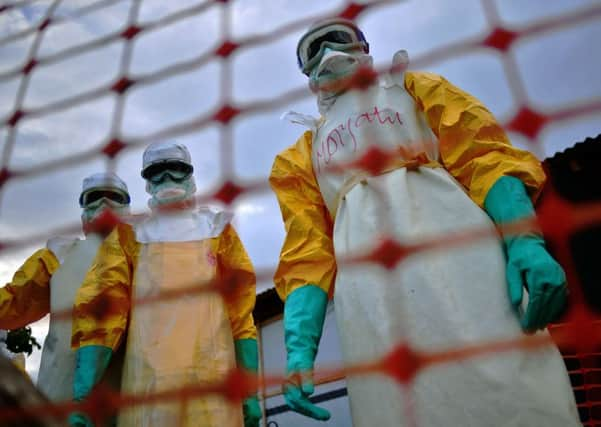Sierre Leone declared free of Ebola virus


The country has not had a new case of the virus for 42 days, meaning Ebola transmission is considered to have been stopped.
Dr Anders Nordstrom, WHO Representative in Sierra Leone, said: “Since Sierra Leone recorded the first Ebola case in May 2014, a total number of 8,704 people were infected and 3,589 have died, 221 of them healthcare workers, all of whom we remember on this day.”
Advertisement
Hide AdAdvertisement
Hide AdHundreds of people gathered in the streets for celebrations in anticipation of the announcement.
Sierra Leone will now enter a 90-day period of “enhanced surveillance”.
In a statement, WHO said: “This new phase is critical for ensuring early detection of any possible new cases of Ebola virus disease.”
The organisation commended the government for achieving the significant milestone and pledged to continue its support during the next phase of monitoring.
Dr Nordstrom said: “We now have a unique opportunity to support Sierra Leone to build a strong and resilient public health system ready to detect and respond to the next outbreak of disease, or any other public health threat.”
Around 4,000 survivors are now battling ongoing health problems and will require medical care and social support.
Ms Cafferkey, who is from South Lanarkshire, first contracted the disease while working as a nurse at the Save the Children treatment centre in Kerry Town.
A report found she was wearing a visor rather than more protective goggles, which she could not get to fit properly.
Advertisement
Hide AdAdvertisement
Hide AdShe was diagnosed in December after returning to Glasgow from the west African country via London.
Ms Cafferkey is still being treated at the Royal Free Hospital in north-west London, months after she was thought to have fought off the Ebola infection.
She suffered a bout of meningitis and her condition worsened, but she has now been treated with the experimental drug GS5734.
Dr Michael Jacobs, from the Royal Free Hospital, described the situation as “unprecedented”, while the WHO said Ms Cafferkey was the only known Ebola survivor to develop meningitis months later.
Dr Jacobs, infectious diseases consultant at the hospital, told a press conference last month: “This is the original Ebola virus she had many months ago which has been inside the brain, replicating at a very low level, and has now re-emerged to cause this clinical illness of meningitis.”
Pete Jones, Ebola response manager for the British Red Cross, said: “There is so much to celebrate in Sierra Leone today.
“When the Ebola outbreak was at its peak last year, it felt like this day might never come.
“The fact that it has is down to the thousands of volunteers and health workers, from Sierra Leone and overseas, who day after day have cared for patients, buried the dead and worked in communities to improve understanding of Ebola - in doing so, taking huge personal risk and often suffering stigma.
Advertisement
Hide AdAdvertisement
Hide Ad“Sadly, however, this is only the beginning of the end. With Ebola still present in neighbouring Guinea, and much that is still unknown about the virus, there is a real possibility that it will resurface in Sierra Leone - one that we need to treat as a case of when, rather than if.”
The UK’s Catholic Agency For Overseas Development (Cafod) welcomed the news and said anyone who had donated to its Ebola crisis appeals should be proud.
Director Chris Bain said: “This is the joyous news that the men, women and children of Sierra Leone have been waiting for.”
He added: “Having gone through an unimaginable time for over a year, the relief must be palpable for the people who have had to live with this terrible disease.”
But Cafod warned the work was far from over and the impact of Ebola was still being felt throughout Sierra Leone, including stigma, job losses and deaths within families.
Foreign Secretary Philip Hammond said the UK would continue to stand with Sierra Leone as it continued its recovery.
He said: “Defeating Ebola has been a long and difficult journey and this achievement belongs first and foremost to the people of Sierra Leone who have demonstrated incredible resilience, bravery and determination.”
He added: “In the face of lives lost and huge sacrifices, we should remember the 221 Sierra Leonean healthcare workers who lost their lives during this epidemic.”
Advertisement
Hide AdAdvertisement
Hide AdMr Hammond said he was proud of the role the UK Government played in galvanising a coalition of nations who led the international response against this disease, saving thousands of lives.
But he warned there was a long way to go: “We know that Ebola may re-emerge and so complacency must be avoided.”